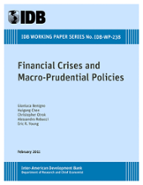Financial Crises and Macro-Prudential Policies
Date
Feb 2011
Stochastic general equilibrium models of small open economies with occasionally binding financial frictions are capable of mimicking both the business cycles and the crisis events associated with the sudden stop in access to credit markets (Mendoza, 2010). This paper studies the inefficiencies associated with borrowing decisions in a two-sector small open production economy, finding that this economy is much more likely to display under-borrowing rather than over-borrowing in normal times. As a result, macro-prudential policies (e. g, Tobin taxes or economy-wide controls on capital inflows) are costly in welfare terms. Moreover, macro-prudential policies aimed at minimizing the probability of the crisis event might be welfare-reducing in production economies. The analysis shows that there is a much larger scope for welfare gains from policy interventions during financial crises. That is to say that, ex post or crisis-management policies dominate ex ante or macro-prudential ones.



